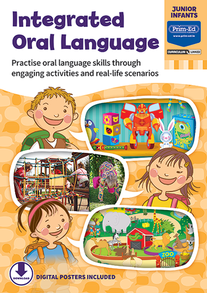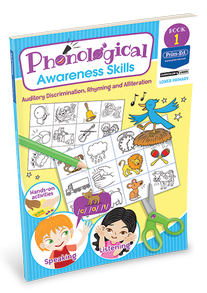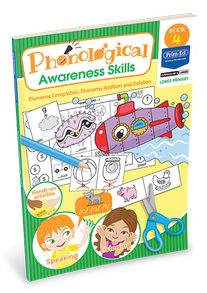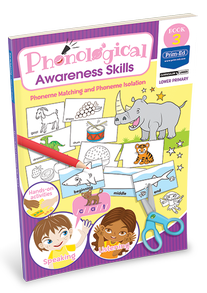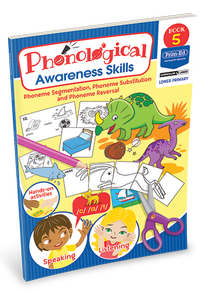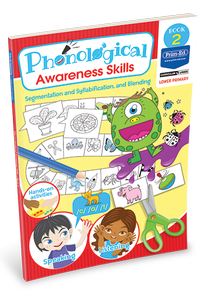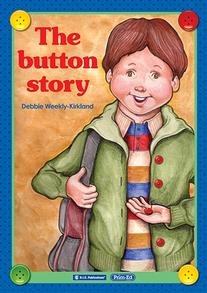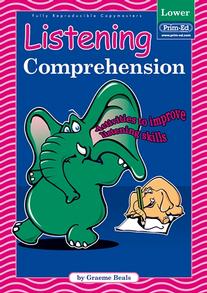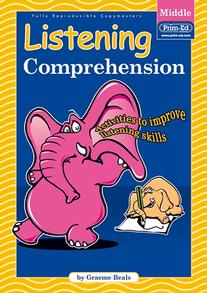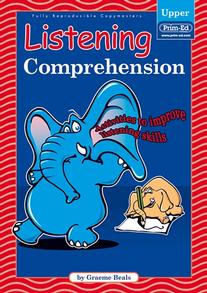-
0
Your cart is currently empty.
-
0
Your cart is currently empty.
Oral Language Games, Activities & Resources
Oral language is an essential part of communication. It includes both speaking and listening and is the foundation for word reading and comprehension. Oral language skills are first developed through children’s interactions with family members before they start formal education. However, when children start school, teachers play an important role in supporting pupils' oral language development.
Prim-Ed Publishing is dedicated to providing high-quality resources for pupils and teachers. Our oral language resources, including worksheets, games and activities, allow pupils to develop their oral language skills and enhance the classroom learning experience.
Oral language skills are important for literacy
Developing oral language skills is important as it teaches children to communicate effectively, listen and understand others. It is the foundation for success in reading, writing and comprehension.
Children must learn to understand spoken language first before they can learn to understand the written word. Oral language skills are particularly important for pupils who are learning English as an additional language.
There is a strong link between oral language and literacy development. Pupils who have difficulty with oral language often struggle with literacy skills.
Oral language should be embedded across the school curriculum and incorporated into daily classroom activities.
To effectively teach oral language, teachers need to create opportunities for pupils to listen, speak, read and write on a daily basis. Classroom lessons and activities such as storytime, drama, word games and role play are all great ways to develop oral language skills.
Resources to support the Primary Language Curriculum
Oral language skills are an important part of the Primary Language Curriculum, across spoken language, reading and writing.
Prim-Ed's oral language resources have been specially designed to support the oral language learning outcomes of the new Primary Language Curriculum. The resources and worksheets aim to develop visual comprehension, active listening and memory skills, as well as improve oral language development in the classroom through hands-on games and activities.
The new oral language learning outcomes of the Primary Language Curriculum include:
- Engagement, listening and attention
- Motivation and choice
- Social conventions and awareness of others
- Sentence structure and grammar
- Vocabulary
- Demonstration of understanding
- Requests, questions and interactions
- Categorisation
- Retelling and elaboration
- Playful and creative use of language
- Information giving, explanation and justification
- Description, prediction and reflection
Prim-Ed’s educational resources are filled with oral language activities, allowing teachers to plan fun lessons and reinforce the skills outlined in the oral language section of the Primary Language Curriculum.
Teaching oral language skills in the classroom
There are many strategies teachers can use to create opportunities for pupils to develop their oral language skills. Create spaces for children to talk throughout the day, from outdoor playtime and storybook reading to music and group activities. Encouraging children to participate in chat, ask questions or solve problems can enhance their engagement in oral language.
Classrooms shouldn't be quiet! Effective oral language instruction involves lessons based around engaging activities, games and conversation, which will allow children and pupils to practise their oral language skills in real-life scenarios.
Here are some tips for teachers to support oral language development in the classroom:
- Encouraging pupils to talk about their interests.
- Using a variety of resources such as stories, rhymes, songs and puppets.
- Creating opportunities for group work and discussions.
- Asking questions that encourage thinking and reasoning.
Oral language resources for teachers
Prim-Ed Publishing has a range of resources to support teachers and learners with their oral language development skills. These include photocopiable books, worksheets, interactive card games, activities, digital posters, lesson plans and assessments.
The resources are designed to engage pupils by allowing them the opportunity to practise oral language skills. Lessons and activities include role plays, barrier games and story creation with a focus on developing critical thinking, as well as creativity through debate or discussions about different topics.
Oral language photocopiable books, activities and games
The resources in Prim-Ed Publishing's range of photocopiable books include:
- Integrated Oral Language series
- Phonological Awareness Skills series
- Everyday Literacy: Speaking and Listening series
- Listening Comprehension three-book series
- Look! Listen! Think! series
- Oral Language series
- Sequencing Visual Texts series
- Speaking and Listening three-book series
Prim-Ed Publishing also offers teachers unique learning tools, card games, full-colour and wordless books:
- Big Books Animal Friends and The Button Story full-colour books
- Lizzie and the Birds reader and teachers guide
- Follow Me! - Loop Card Games English three-book series
Oral language lessons in the classroom
Oral language is intrinsic to the ongoing development of primary aged children from preschool to 6th Class, so it is best taught in a fun and engaging way.
Here are some games and activities that you can use in your lessons to help develop oral language skills:
- Simon Says - This is a classic game that can be played with any number of children. It helps to develop listening skills as well as following instructions.
- My Granny Went to Market - This is a great game for developing vocabulary. It can be played with any number of children.
- Who Am I? - This is another classic ‘guess who?’ game that can be played with any number of children. It helps to develop listening skills and memory recall.
- Storytelling - This is a great activity for developing oral language skills such as speaking fluently, using descriptive words and using expression. You can use props or puppets to help tell the story.
- Rhyming Games - These are great for developing phonemic awareness and oral language skills such as alliteration and rhyming words.
- Wordless Books - These books are great for encouraging storytelling and oral language development. They also help to develop visual literacy.
Prim-Ed Publishing's oral language resources will help teachers develop this important life skill in their pupils so that they are confident in using language.
Prim-Ed also offers a range of English resources, including worksheets and teacher guides, plus much more. Reach out to us or download the catalogue to see the latest products for your school.
Frequently asked questions
Why are oral language skills important?
Oral language skills are important because they are the foundation for written language, reading and comprehension. Teaching oral language skills in the classroom helps to develop listening skills and memory recall.
What are some oral language games and activities?
Some oral language games and activities include storytelling, rhyming games and wordless books. These activities help to develop fluency, using expression and descriptive words, phonemic awareness, alliteration, rhyming words and visual literacy.
How do I teach oral language in the classroom?
There are many ways to teach oral language skills in the classroom. Games and activities are a great way to teach these skills as these help to develop listening, memory recall, sentence structure and build vocabulary among many other developmental learning outcomes
What are the best oral language resources for teachers?
There are many oral language resources available for teachers. These resources include books, games, activities, worksheets and lesson plans.
When selecting oral language resources for the classroom it is important to consider the age and ability of your pupils as well as the outcomes you wish to achieve.
How can I teach oral language at home?
Parents can support their child's oral language development by talking, singing and reading with them on a daily basis. It is also important to provide opportunities for your child to talk. This can be done through conversation, role play or drama.
Here are some oral language games and activities that you can use in the classroom or at home:
- Simon Says - This is a classic game that can be used to develop listening skills as well as following instructions.
- I Spy - This game can be used to develop vocabulary and memory recall.
- Who Am I? - This game helps pupils to think about character traits and how to describe people.
- Tongue Twisters - Tongue twisters are great for developing clear pronunciation and phonological awareness.
